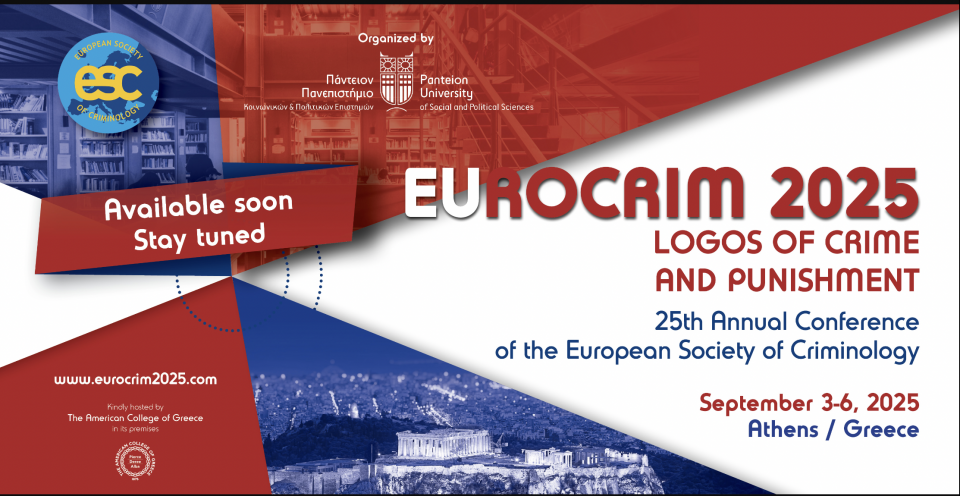Presidential address, Michele Burman
In my first Presidential message I wish firstly to thank the members of the European Society of Criminology for electing me as President and for giving me the honour to serve the Society in that role.
I’d also like to thank the organisers and all of the participants in the 24th Annual ESC Conference, held in Bucharest in September for making it a success. Immense thanks must go to Andra-Roxanna Trandafir and Doru Herinean and their local team who did sterling work to put together and pull off an excellent conference. Organising a successful international conference takes hard work, tenacity and formidable organisational skills and Andra and Doru demonstrated all of these qualities in their skilful preparation and delivery of the Bucharest conference, which actually was originally due to take place in 2020, but postponed until 2021 due to Covid-19, and finally took place in 2024. Many thanks also go to Csaba Györy in his role as conference coordinator and to Marcelo, as always, for his unwavering support for conference organisation and protocols. The Bucharest conference hosted 76 pre-arranged panels; 32 roundtables; 13 author-meets-critics; 243 panel sessions, and 114 posters, and more details on the conference can be found in Anna Di Ronco’s piece in this Newsletter.
I also would like to thank Klaus Boers and Barbora Hola who this year completed their mandate as members of the Board, and to say thank you and goodbye to Barbara Gualco (organiser of the 23rd Annual Conference in Florence). A very warm welcome to Anna-Maria Getos as incoming President-Elect and Marieke Kluin as the elected new at-large board member. We also welcome to the Board Dagmara Wo¬niakowska of Warsaw University who will be organising our Annual Conference in Warsaw in 2026.
My year as President-Elect has passed very swiftly, but has given me both reason and opportunity to think more directly about why the ESC matters for Criminology and criminologists working across Europe. Since joining the ESC in 2001, I have had the pleasure of observing the marked expansion of the criminological community of Europe, not only in student numbers but also accompanied by a diversification of the kind of research which
sits within its purview. Currently, the ESC has 1556 members, an exponential growth since its inception. I was struck at the recent conference at the scope, scale and eclecticism of criminological work featured in the programme (including, for example, Green Criminology, Historical Criminology, Narrative Criminology, Gender, Crime and Justice, Computational Criminology and the interrelationships between crime, science and politics). The conference showcased research on just about any criminological topic you care to think of - and much includes work by early career criminologists. It is clear, to me at least, that the ESC, through its members, embodies some of the most exciting and innovative criminological research, teaching and practice in the world, with European authors routinely published and cited in top criminology journals.
The ESC is also an enabler. Through its activities, events and networks it enables connections to be forged, new criminological questions to be posed, and the continuing pursuit of more perennial ones.
I have relished the opportunity to meet colleagues beyond my own institution and country, and discover new ways to engage with criminological questions. Moreover, through its provision of an open and inclusive environment, the ESC offers an opportunity to support the objectives listed in its constitution (e.g., bringing together criminologists in one multi-disciplinary society, advancing Criminology, encouraging exchange and cooperation, acting as a forum of dissemination of knowledge) whilst fostering an open and inclusive environment nurturing ideas and links across borders.
Recognising that our current volatile research environment particularly affects early career researchers and doctoral students, the inaugural Summer School held in Lausanne this past summer planted seeds to support the building of capacity of future generations of criminologists and facilitate the development of cross-Europe networks. Attended by young scholars from across Europe, this proved a resounding success(1) and plans are underway for the second Summer School to be held in June 2025.
But all this should not obscure the challenges likely to be faced by the ESC and its members in the coming years, in terms of, for example, the incursion of AI into academia which brings complex tensions between innovation and ethical, methodological and epistemological questions and poses challenges to critical thinking; the Open Access agenda (which carries implications for learned societies more generally)(2); for some, a tightening of government control on research agendas and funding opportunities, and; the profound social and political transformations shaping our world that compel us to continually address their causes and implications through criminological enquiry.
As criminologists, we often go into places that aren’t easy. Many of us encounter challenging situations
in our research, whilst receiving little support from our home institutions. Some of us operate in more restrictive conditions where particular research topics can be out of bounds. Our research findings can be suppressed and our intellectual curiosity can be diminished or stifled by policies and politics that silence. Politics will always infiltrate Criminology and Criminal Justice by their very nature, and, whilst there may be divergent opinions on how to respond to political pressures and differences, such differences are to be respected and the ESC remains an open and inclusive Society for scholarly debate.
Following careful consideration and protracted discussion, the ESC Board have developed a statement which restates the ESC’s mission, as outlined in its constitution, and which reaffirms that, whilst the ESC Board refrains from taking a position on conflicts occurring outside Europe, it condemns all violations of human rights and international crimes. As the ESC Board, we promote respectful scholarly engagement and continue to encourage members to examine the impacts of politics within criminology, and the social and individual impact of international crimes and other atrocities, and to continue to develop and promote laws, policies, and measures for their mitigation. The full statement of the ESC Board can be found in the News section of the ESC website.
In light of the increasing importance of research integrity and occurrences of research misconduct, it seems timely for the ESC to consider developing a set of principles for responsible ethical practice. Many existing professional societies’ codes or frameworks of ethical practice incorporate the vision and values of the society, reflect its professional standards and set out researcher responsibilities, clarify the conditions under which disciplinary work can take place, highlight ethical considerations, and emphasise a duty of care to maintain safety and wellbeing of research participants and researchers.
In considering the need or desirability of a set of principles for the ESC, the aim should not be to impose a single model of ethical practice or a single set of processes, but rather to provide a frame of reference (a set of principles) which raise awareness of ethical issues, researcher responsibilities and professional conduct (including towards colleagues). Such a framework would aim to support the professional autonomy of European criminological researchers and inform their professional and ethical judgement but should necessarily be read in the light of any other professional ethical guidance to which they are subject, including those issued by individual academic institutions. This is an issue for further consideration through the coming year.
Many of you will know that next year – 2025 - marks the 25th anniversary of the European Society of Criminology. Twenty-five years since the inception of the ESC, and the first, memorable, ESC Annual Conference held in Lausanne. Over the coming year there will be several ways to mark this silver anniversary; these include a number of blog entries published throughout the year, and a call for ESC members to send their thoughts and reflections on memorable ESC moments over the past 25 years (max. 60 words!). These could be reflections on theoretical developments or methodological shifts, or simply thoughts or memories of good times, good friends and fruitful discussions at ESC events over the past 25 years. Reflections will be collated in an online Livre D’Or to act as a living record, and archive and offer a contribution to the intellectual history of the ESC connecting the past of the Society to its future. Further information about the 25th anniversary call can be found in this newsletter.
The forthcoming ESC Annual Conference in Athens (3 - 6 September 2025) will be the academic highlight of the anniversary year. The local organisers, led by Effie Lambropolou, are working hard to make this 25th anniversary conference a success, but also an opportunity for celebration and reflection. Last October, the Board had the pleasure of visiting the conference venue - the American College in Greece - a spacious, green and leafy location just outside Athens city centre. At the conference, it is envisaged that there will be a roundtable looking back on 25 years of the ESC and a second roundtable looking forward to another 25 years of the ESC, linking the present with the past and thinking critically about its future. Convenors of Working Groups will be asked to consider holding one of their panel sessions at the Athens conference reflecting on continuity and change in their particular field over the past 25 years. Taken together these activities will add to the collection of the intellectual history of the ESC and the evolution of the discipline across Europe over the period.
The Board and I look forward to seeing you in Athens!

(1) For a view from students, see in this newsletter the piece by Daniela-Irina Stadniciuc, “The ESC Summer School – My Adventure from Research Insights to Impact and Everything in Between”.
(2) Editorial note: the ESC hosts the European Network for Open Criminology (ENOC), which intends to bring together criminologists inter- ested in open research and open science, aiming to become one of the driving forces for the promotion, training, application and rewarding of open research practices in criminology. More information about this and other ESC working groups here.
